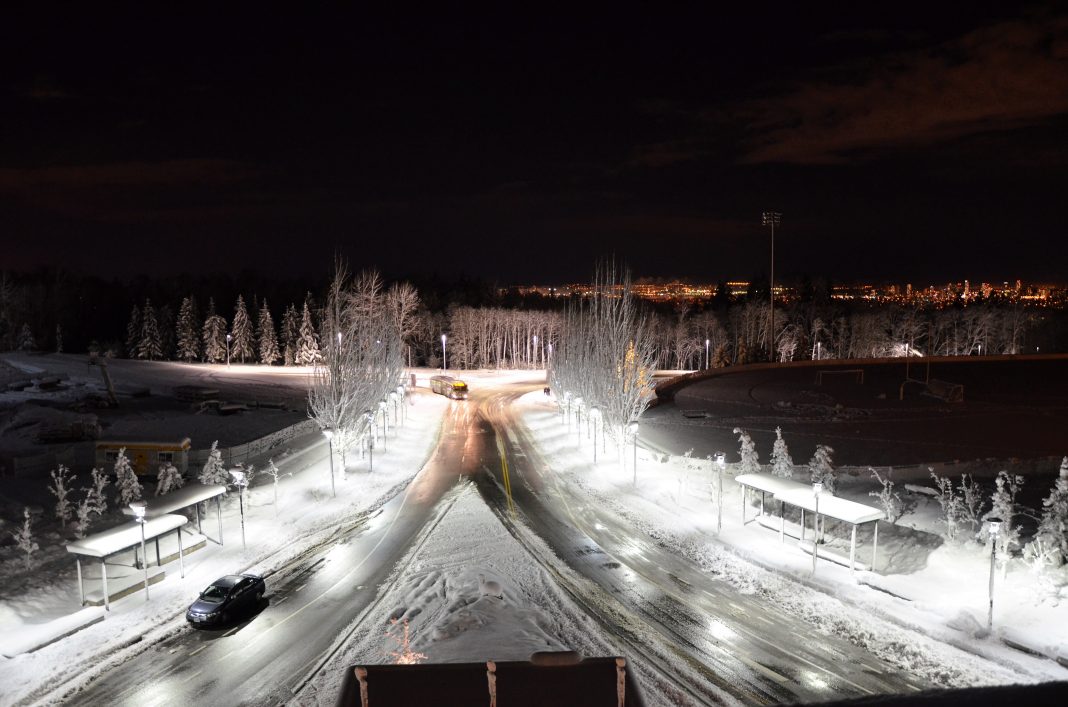By: Nathaniel Tok
TransLink has unveiled its plans to brave the snow-covered roads up to the main Simon Fraser University campus this year. The transit provider is taking additional steps this time around since major snowfall in Metro Vancouver last year caused extensive disruptions to much of the region’s public transportation.
“Maintaining transit service during winter storms is important to us, and we’re always looking for ways to improve what we do and update our winter response plans,” TransLink spokesperson Chris Bryan told The Peak in a statement.
Last year, winter weather left hundreds of students stranded on Burnaby Mountain with exams and classes cancelled and bus service up the mountain suspended due to hazardous road conditions. The students living in university residences were also unable to get off the mountain to attend exams at other campuses.
TransLink has given transportation to and from SFU during the winter months this year centre stage. The company has said it will test out ‘tire socks’ on its vehicles if conditions on the mountain deteriorate to the point that buses have traction challenges.
The tire socks will be fitted on four 40-foot buses as shuttles on the 145 bus route from Production Way SkyTrain Station to SFU Burnaby. According to the TransLink spokesman, the tire socks have been successfully used in snowy conditions in Scandinavia.
“This year we are preparing for the worst.” – Chris Bryan, TransLink spokesperson
“Burnaby Mountain has always been a challenge in snow for all vehicles, buses included,” Bryan added. “If we find [the tire socks] are working very well, we will move to expand their use to other challenging areas of the transit system as quickly as possible.”
Translink is also prepared to swap out its 60-foot articulated buses for 40-foot conventional buses which operate better in snowy or icy road conditions on routes up the mountain. SFU is at a higher elevation compared to the rest of Metro Vancouver and often experiences greater severity in winter conditions.
TransLink has also noted its plans to address problems in other parts of the transit system. There will be anti-icing sprayers used to keep SkyTrain and electric trolley bus lines free of ice build-up in addition to extra staff on scene during challenging conditions. The company will also have an arborist review all trees and branches within 10 metres of the SkyTrain and West Coast Express tracks.
“TransLink did a good job of keeping people moving [last year],” Bryan said at a press conference on November 2. “But there is always room for improvement. This year we are preparing for the worst.”
He added that the company is investing in ways to keep people informed about travel on each of its routes, including alerts and social media updates.
The TransLink buses are already equipped with all-weather tires that are rated for snow, a recommendation of the provincial government. However, the tire socks will wrap around the tire to provide additional traction on steep and snowy routes.
The tire socks help to increase the contact surface area between the snow or ice and the tire, explained Simon Agnew, a maintenance engineer at the Coast Mountain Bus Company, in a video posted by TransLink.
“Our rider comfort is still very good, there is no noise that comes from [the snow socks],” Agnew said in a demo, adding that the socks are easy to install and will take about two or three minutes to place on each of the tires.
The installation was one of the factors that went into the company’s decision to test out this particular device.
SFU advises students to check its website and social media pages for updates on changing weather conditions on the campus. It also warns students not to try to walk down the mountain or drive a car that is not equipped for winter conditions during a severe weather event.




